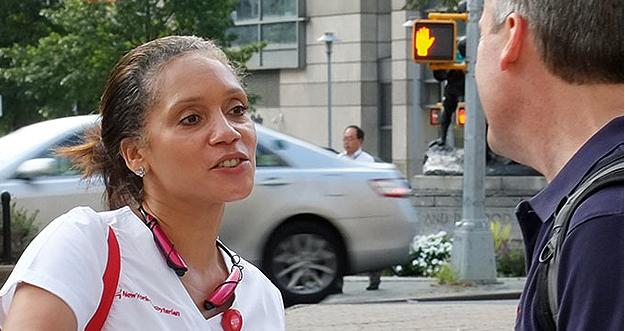Zika: Getting the word out

NYSNA nurses are joining public health officials in educating the public on the growing threat posed by the Zika virus.
Top New York City health officials have spent recent weeks conducting outreach in the city’s Puerto Rican and Dominican neighborhoods.
The city has more cases of Zika infection than any other part of the continental U.S., and in recent weeks, more than 1,200 pregnant women have met the criteria for a Zika test (i.e. they had either traveled to an infected country or had unprotected sex with someone who had). The number of pregnant women requesting a test is one of the few reliable data points the city can use to see whether its message is reaching its intended audience.
Safeguarding public health
At an August 17 press conference, NYC Public Advocate Letitia James unveiled new recommendations to combat the virus, with particular emphasis on stopping its spread through sexual transmission.
Anne Bové, RN, our union’s Secretary and President of NYSNA’s H + H/Mayorals Executive Council, said, “The Public Advocate’s recommendations are concrete steps to help safeguard the health of all New Yorkers. They add to efforts already underway by city and state authorities to limit the spread of mosquito-borne disease and educate the public.”
As part of the 6-Step New York State Zika Action Plan, 20,000 Zika protection kits are available to women who are either pregnant or trying to get pregnant in 10 regions throughout the state. The kits include educational materials, insect repellent, condoms and mosquito dunks to treat water and prevent mosquitoes from breeding.
Educating the community
On September 9, several NYSNA nurses from NY Presbyterian Hospital handed out educational flyers outside the 168th Street and Broadway subway station in the predominantly Dominican area. State Senate candidate Marisol Alcantara, a NYSNA staff member who along with the Mayor and Public Advocate is calling on Congress to fund a $1.9 billion Zika virus emergency bill, joined the nurses.
As Ms. James said at her August press conference, “Unfortunately, diseases…they don’t stop because of vacations.... They don’t defer to elected officials who take vacations. This is a healthcare crisis and obviously Congress really needs to get back into session and provide additional funding to protect the lives of Americans.”
There are still many unknowns about Zika transmission and the long-term effects of Zika-induced birth defects. Until more information becomes available, healthcare workers are cautioned to take all possible measures to avoid occupational risks of infection through needle sticks and other blood exposing procedures.